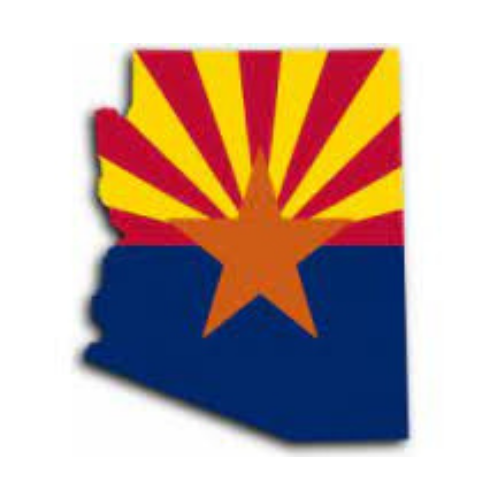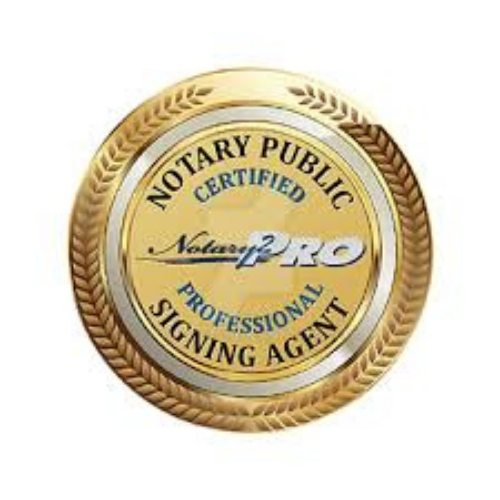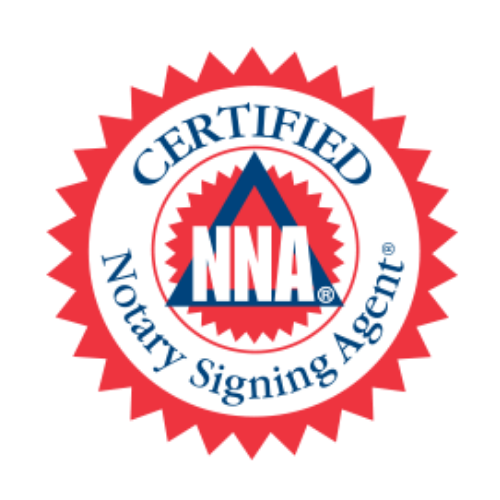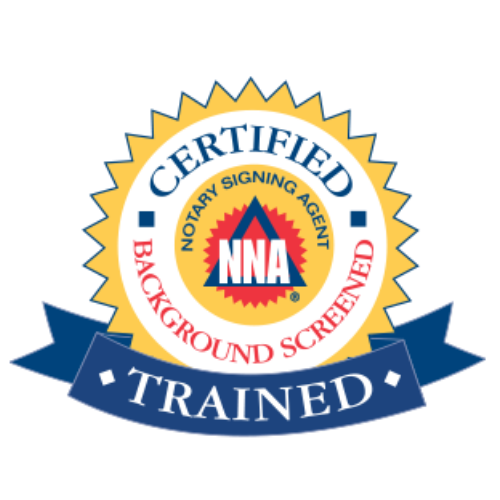F.A.Q
Common Questions
General
What is a notary Public?
A notary public is an individual authorized by the government to perform various legal formalities and act as an impartial witness in the signing of documents. The primary role of a notary public is to verify the identities of individuals signing documents, confirm their willingness to sign, and administer oaths or affirmations when required. Notaries are responsible for preventing fraud and ensuring the integrity of legal documents. Notaries are appointed or commissioned by the government and must adhere to specific laws and regulations governing their practice.
What is a notary/Loan Signing Agent?
A notary signing agent is a specialized type of notary public who is trained and authorized to facilitate the signing of loan and mortgage documents. Their primary role is to oversee the execution of loan documents during real estate transactions, ensuring that all parties involved complete the necessary paperwork accurately and in compliance with legal requirements. Notary signing agents are familiar with the specific documents used in loan closings and are knowledgeable about the signing process. They often travel to meet borrowers at a convenient location, such as their home or office, to conduct the signing. Notary signing agents play a crucial role in ensuring the smooth and efficient completion of loan transactions, acting as a neutral and trusted intermediary between lenders, borrowers, and other parties involved.
What responsibilities does a notary public have?
A notary public has several responsibilities, including verifying the identity of individuals signing documents, ensuring their willingness to sign, administering oaths or affirmations, and affixing their official seal or stamp to certify the authenticity of the documents. They are also responsible for maintaining proper records of notarial acts, following applicable laws and regulations, and upholding the principles of impartiality and integrity. Additionally, notaries may be required to perform other specific duties as mandated by their jurisdiction, such as certifying copies of documents or providing document translation services. Overall, a notary public serves as a trusted and impartial witness in various legal and official transactions.
Can a notary decline services?
Yes, a notary public has the right to decline providing their services in certain situations. There are valid reasons for a notary to refuse a request, such as if they have a personal or financial interest in the transaction, if they suspect fraud or dishonesty, if the signer is unable to prove their identity, or if the notary believes that the signer does not understand the nature or consequences of the transaction. Additionally, a notary may decline services if they are not familiar with the type of document involved or if they are unable to meet specific legal requirements. It is important for a notary public to exercise their professional judgment and act in accordance with the laws and regulations governing their practice.
Why are notary signing agents background screened?
Notary signing agents undergo background screening as part of the process to ensure the integrity and trustworthiness of individuals handling sensitive loan and mortgage documents. The screening helps verify that the signing agent has a clean criminal record and no history of fraudulent activities. By conducting background checks, lenders and title companies can have greater confidence in the signing agent’s professionalism, reliability, and ability to handle confidential information appropriately. This practice aims to protect the interests of all parties involved in loan transactions and maintain the security and trustworthiness of the notary signing agent profession.
Documents
Can a signing agent help complete documents or give advice?
No, a signing agent’s role is strictly limited to overseeing the signing of loan and mortgage documents. They are not authorized to provide legal advice, assist in completing documents, or offer guidance on the content of the documents. Signing agents are responsible for ensuring that the necessary documents are signed and executed properly by all parties involved. However, if there are questions or concerns about the documents, it is advisable to consult with a qualified legal professional or the relevant parties involved in the transaction. The signing agent’s primary duty is to act as a neutral and impartial witness during the signing process, ensuring that it is conducted in accordance with the applicable laws and regulations.
Can an incomplete document be notarized?
No, an incomplete document cannot be notarized. A notary public can only notarize a document that is fully completed at the time of notarization. This means that all necessary fields, sections, or required information must be filled out before the notary can proceed with the notarization. The notary’s role is to verify the identity of the signer and ensure that they understand the document they are signing. If a document is incomplete or missing essential details, the notary cannot proceed with the notarization until it is properly completed. It is important to have all relevant information in place before seeking the services of a notary public.
Can an incomplete document be notarized?
No, an incomplete document cannot be notarized. A notary public can only notarize a document that is fully completed at the time of notarization. This means that all necessary fields, sections, or required information must be filled out before the notary can proceed with the notarization. The notary’s role is to verify the identity of the signer and ensure that they understand the document they are signing. If a document is incomplete or missing essential details, the notary cannot proceed with the notarization until it is properly completed. It is important to have all relevant information in place before seeking the services of a notary public.
Is a notary public allowed to prepare, review, or finalize a legal document?
No, a notary public is generally not authorized to prepare, review, or finalize a legal document. The role of a notary public is primarily to verify the identities of individuals signing documents and to ensure that the signing process complies with legal requirements. While notaries may be knowledgeable about certain types of documents, they are not trained or licensed to provide legal advice or to take part in the substantive preparation or review of legal documents. It is recommended to consult with a qualified legal professional for assistance with document preparation, review, or finalization.
Credible Witness
WHAT ARE CREDIBLE IDENTIFYING WITNESSES?
Credible identifying witnesses are individuals who can vouch for the identity of a signer in the absence of acceptable identification documents. In situations where a signer lacks proper identification, some jurisdictions allow the use of credible witnesses who personally know the signer and can confirm their identity. These witnesses must be impartial, trustworthy, and have valid identification themselves. They provide sworn statements or affidavits attesting to the identity of the signer, enabling the notary public to proceed with the notarization. The specific requirements for credible identifying witnesses may vary depending on local laws and regulations.
Signing Appointments
How do You Prepare for a signing appointment?
All signers of documents to be notarized must be physically present during the signing process and have valid identification.
What if a signer has a disability that prevents them from signing their name?
In cases where a person with a disability is unable to physically sign a document, they may use an “X” as their signature in the presence of two witnesses who are personally acquainted with the signer and have no personal interest in or involvement with the document. The witnesses must provide valid identification as required.
Types of Notarization
What is An Acknowledgement?
A notary acknowledgment, also known as a notarial acknowledgment, is a formal declaration made by a notary public to verify the authenticity of a signature on a document. When a document requires an acknowledgment, the individual signing the document appears before a notary public and acknowledges their signature as their own. The notary public then verifies the identity of the signer, confirms that they signed the document willingly and knowingly, and completes the acknowledgment by attaching their official seal or stamp. The notary acknowledgment serves as evidence that the signature on the document is genuine and was voluntarily executed in the presence of the notary. It adds an extra layer of credibility and validity to the document, especially in legal and business transactions.
What is A Jurat?
A notary jurat, also known as a sworn statement or affidavit, is a type of notarial act performed by a notary public. In a jurat, the individual appearing before the notary affirms or swears to the truthfulness and accuracy of the contents of a document or statement. The notary public administers an oath or affirmation to the signer, who then signs the document in the presence of the notary. The notary, in turn, verifies the identity of the signer and completes the jurat by affixing their official seal or stamp. The jurat confirms that the document was signed under oath or affirmation, attesting to its authenticity and truthfulness. Jurats are commonly used for affidavits, depositions, and other legal or sworn statements that require the signer to make a formal declaration under penalty of perjury.
What is copy certification?
A notary copy certification, also known as a certified copy or notarized copy, is a service provided by a notary public to authenticate the accuracy and legitimacy of a photocopy or reproduction of an original document. When a person needs a certified copy of a document, they present the original document to a notary public, who then compares it to the photocopy. After verifying that the photocopy is a true and accurate reproduction of the original, the notary certifies the copy by attaching their official seal or stamp, along with a statement indicating that it is a true and correct copy. This certification confirms that the copy is authentic and can be relied upon as if it were the original document. Notary copy certifications are commonly required for various purposes, such as legal proceedings, official records, academic transcripts, or identification documents.
What is an affirmation?
A notary affirmation is a declaration made by an individual before a notary public, in which they assert the truthfulness and accuracy of a statement or document. Unlike an oath, which involves invoking a higher power, an affirmation allows individuals to make a solemn declaration without reference to a religious belief. During a notary affirmation, the individual affirms, under penalty of perjury, that the contents of the statement or document are true and accurate to the best of their knowledge. The notary public verifies the identity of the affiant and may require them to sign the document in their presence. By affixing their official seal or stamp, the notary confirms the affirmation and certifies the authenticity of the document. Notary affirmations are commonly used in legal proceedings, where a person’s truthfulness and honesty are required, and religious beliefs may not be relevant or applicable.
What is an oath?
A notary oath refers to the solemn promise or pledge taken by a notary public to faithfully perform their duties and responsibilities in accordance with the law. When assuming the role of a notary, an individual typically takes an oath of office or an affirmation, which varies depending on local regulations and practices. The oath generally includes a commitment to uphold the principles of impartiality, integrity, and confidentiality in notarial acts. It may also involve a promise to administer oaths and affirmations truthfully and accurately, verify the identity of signers, and faithfully execute the duties of a notary public. By taking the notary oath, a notary public demonstrates their commitment to upholding the standards of their profession and serving the public with honesty and integrity.
Identification
What identification is required for a notary to perform a notarization?
Accepted forms of identification for notarization purposes must include the signer’s photograph, signature, identifying number, and a physical description, which covers details like height, weight, hair color, and eye color. The following are examples of valid identification documents:
- Unexpired driver’s license or identification card issued by a state or territory of the United States.
- Unexpired United States passport issued by the United States Department of State.
- Unexpired United States military identification card from any branch of the United States Armed Forces.
- Inmate identification card issued by the Department of Corrections and Rehabilitation for signers in custody.
- Any other unexpired identification card issued by the United States Government, state government, or tribal government, containing the individual’s photograph, signature, and physical description.
For real estate transactions in the USA involving Canadian or Mexican citizens, a valid unexpired passport issued by a national government other than the United States, accompanied by a valid unexpired visa or other necessary documentation to establish the individual’s legal presence in the United States.
What identification is unacceptable?
Here are some examples of identification that are frequently presented but are not acceptable for notarization:
- U.S. Military Common Access Card
- Green Cards, including Permanent Resident and Border Crossing Cards
- Social Security Cards
- Credit Cards, whether they have photographs or not
- Temporary Driver’s License
- Driver’s License without a photograph
- Marriage License
- Birth Certificate
- Organizational Membership Cards
What if a signer lacks valid, expired or acceptable identification?
If you lack valid identification, you can still be identified through credible identifying witnesses. One credible identifying witness is sufficient if they are personally known to the notary and can produce acceptable identification. However, if the notary is not familiar with either witness, two credible identifying witnesses are required.
These witnesses must know you personally, take an oath confirming your identity, and present acceptable identification. It is important to note that the witnesses should not have any vested interest in or be named in the document.
What if if the name on the document does not match the signer's identification?
If the name on the document does not match the signer’s identification, there are specific guidelines to consider:
Accept “Less of a Name” Than Appears on the Identification: If the document shows a name that is a shortened or abbreviated version of the name on the identification, the notary may proceed with the notarization. For example, if the identification reads “Norton John Smith” and the document shows “Norton J. Smith,” the notary can accept the identification as it defines the initial.
Do Not Accept “More of a Name” Than Appears on the Identification: If the document displays a name that includes additional elements not present on the identification, the notary cannot proceed with the notarization. For instance, if the identification reads “Norton J. Smith” but the document states “Norton John Smith,” the notary cannot accept the identification as it does not define the full name.
It is essential for the name on the document and the identification to match accurately, adhering to these guidelines to ensure the validity and integrity of the notarial process.
What if the signer's identification has their maiden name, but the document shows their married name?
To proceed with notarization, the name on the identification should either match the document or follow the “less but not more than” rule. (See above)
If acceptable identification is not available, credible identifying witnesses may be utilized as discussed previously.
*Please note that marriage licenses, social security cards, temporary driver’s licenses, and credit cards (with or without photos) are not considered acceptable forms of identification.
Online Notarization (RON)
WHAT IS A Remote Online Notarization (RON) SIGNING?
A Remote Online Notarization (RON) signing refers to the process of notarizing documents electronically using audiovisual technology and secure online platforms. This allows individuals to have their documents notarized remotely, without the need for in-person interaction with the notary public. RON signings provide convenience and accessibility, especially for those who are unable to physically meet with a notary. The use of advanced technology ensures the security, integrity, and validity of the notarization process, offering a reliable and efficient solution for remote document notarization.
What is the process of Remote Online Notarization (RON) signing?
The process of Remote Online Notarization (RON) signing involves several steps. First, the signer and the notary connect through a secure online platform using audiovisual technology. The signer presents their identification documents electronically to the notary for verification. The notary then witnesses the signing of the document in real time, ensuring the signer’s identity and intent. Once the signing is complete, the notary affixes their electronic notary seal and signature to the document. The digitally notarized document is then securely stored and can be shared electronically as needed. RON signing offers convenience, efficiency, and security for remote document notarization.
CAN AN ARIZONA NOTARY PERFORM A RON SIGNING FOR A SIGNER IN ANY STATE?
No, an Arizona notary cannot perform a Remote Online Notarization (RON) signing for a signer located in any state. The ability to perform RON signings across state lines depends on the laws and regulations of each specific state.
Notaries must comply with the legal requirements of the state where the signer is physically located at the time of the notarization. It is important to consult the laws and regulations of the specific state to determine if RON signings are permitted and if out-of-state notaries are authorized to perform them.
What do I need for a RON signing?
For a Remote Online Notarization (RON) signing, you will need the following technology:
-
A computer or mobile device: You will need a reliable computer or mobile device with internet access to connect with the online notary platform.
-
Webcam and microphone: Your computer or mobile device should have a built-in webcam and microphone, or you can use external devices for video and audio communication during the signing.
-
Secure internet connection: Ensure that you have a stable and secure internet connection to maintain a smooth and uninterrupted RON signing session.
-
Online notary platform: You will need access to an online notary platform or service that supports RON signings. This platform will facilitate the video conference, document sharing, and electronic notarization process.
-
Document signing software: Depending on the platform you use, you may need document signing software that allows you to electronically sign and notarize documents.
It’s important to check the specific requirements of the online notary platform you plan to use, as they may have additional technology or software requirements.
Which types of notarizations are allowed to be conducted online through Remote Online Notarization (RON)?
Certain types of notarizations are permitted to be conducted online through Remote Online Notarization (RON). These include:
- Acknowledgments
- Jurats
- Copy certifications
- Oaths or affirmations
Get In touch
Get a Free Estimate or Schedule an Appointment
Real Estate Closer
Purchases, Seller, Refinance, HELOC, Deeds, Loan Applications, Quick Claim Deeds, Reverse Mortgages, and Respa Applications.
Notary Services
Adoptions, Auto Loan Titles, Bill of Sale, Contracts, Financial Documents, Healthcare POA, I9, Identification Affidavits, Medical Directives, Power of Attorney, Structured Settlements, Subordinations, Trusts, Wills, Misc.
Mobile Service
Save time and effort by avoiding the need to travel to a notary office. Enjoy the flexibility of having your documents notarized at your home, office, or any other convenient place that suits you best.
Remote Notarization
Benefit from the flexibility of accessing notary services anytime, anywhere, while ensuring the security and authenticity of your important documents.





